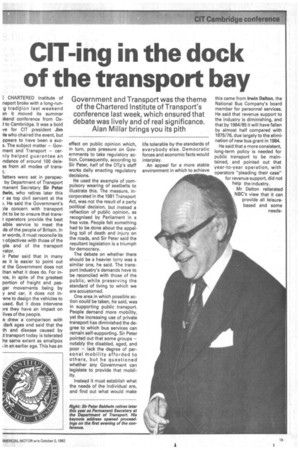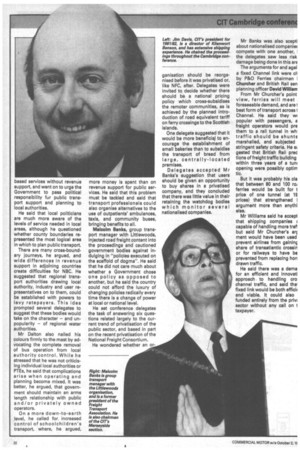CIT-ing in the dock of the transport bay
Page 15

Page 16

If you've noticed an error in this article please click here to report it so we can fix it.
Government and Transport was the theme of the Chartered Institute of Transport's conference last week, which ensured that debate was lively and of real significance. Alan Millar brings you its pith
E CHARTERED Institute of nsport broke with a long-rung tradi4ion last weekend 3n it moved its summer )kend conference from OxIto Cambridge. It was a bold ye for CIT president Jim ris who chaired the event, but ppears to have been a suc s. The subject matter — Govment and Transport — cernly helped guarantee an .ndance of around 100 dele3S from all modes of trans
letters were set in perspecby Department of Transport manent Secretary Sir Peter lwin, who retires later this r as top civil servant at the ). He said the Government's )Ie concern with transport Iht to be to ensure that transoperators provide the best sible service to meet the ds of the people of Britain. In ar words, it must reconcile its objectives with those of the pie and of the transport rator.
ir Peter said that in many BS it is easier to point out it the Government does not than what it does do. For inice, in spite of the greatest portion of freight and pasger movements being by y and car, it does not inrene to design the vehicles to used. But it does intervene )re they have an impact on lives of the people.
e drew a comparison with dark ages and said that the th and disease caused by I transport today is tolerated he same extent as smallpox ; in an earlier age. This has an effect on public opinion which, in turn, puts pressure on Gov ernments to take regulatory action. Consequently, according to Sir Peter, half of the DTp's staff works daily enacting regulatory decisions.
He used the example of compulsory wearing of seatbelts to illustrate this. The measure, incorporated in the 1981 Transport Act, was not the result of a party political decision, but instead a reflection of public opinion, as recognised by Parliament in a free vote. People felt something had to be done about the appalling toll of death and injury on the roads, and Sir Peter said the resultant legislation is a triumph for democracy.
The debate on whether there should be a heavier lorry was a similar one, he said. The trans port industry's demands have to be reconciled with those of the public, while preserving the standard of living to which we are accustomed.
One area in which possible action could be taken, he said, was in supporting public transport.
People demand more mobility, yet the increasing use of private transport has diminished the de gree to which bus services can remain self-supporting. Sir Peter pointed out that some groups — notably the disabled, aged, and poor — lack the degree of per sonal mobility afforded to others, but he questioned whether any Government can legislate to provide that mobility.
Instead it must establish what the needs of the individual are, and find out what would make life tolerable by the standards of everybody else. Democratic forces and economic facts would interplay.
An appeal for a more stable environment in which to achieve this came from Irwin Dalton, the National Bus Company's board member for personnel services. He said that revenue support to the industry is diminishing, and that by 1984/85 it will have fallen by almost half compared with 1975/76, due largely to the elimination of new bus grant in 1984, He said that a more consistent, long-term policy is needed for public transport to be maintained, and pointed out that year-to-year operation, with operators "pleading their case" for revenue support, did not help the industry.
Mr Dalton reiterated NBC's view that it can provide all leisurebased and some needs
based services without revenue support, and went on to urge the Government to pass political responsibility fur public transport support and planning to local authorities.
He said that local politicians are much more aware of the levels of service needed in local areas, although he questioned whether county boundaries represented the most logical area in which to plan public transport.
There are many cross-boundary journeys, he argued, and wide differences in revenue support in adjoining countries create difficulties for NBC. He suggested that regional transport authorities drawing local authority, industry and user representatives on to them, could be established with powers to levy ratepayers. This idea prompted several delegates to suggest that these bodies would take on the character — and unpopularity — of regional water authorities.
Mr Dalton also nailed his colours firmly to the mast by advocating the complete removal of bus operation from local authority control. While he stressed that he was not criticising individual local authorities or PTEs, he said that complications arise when operating and planning become mixed. It was better, he argued, that government should maintain an arms length relationship with public and/or privately owned operators.
On a more down-to-earth level, he called for increased control of schoolchildren's transport, where, he argued, more money is spent than on revenue support for public services. He said that this problem must be tackled and said that transport professionals could also organise alternatives to the use of outpatients' ambulances, taxis, and community buses, bringing benefits to all.
Malcolm Banks, group transport manager with Littlewoods, injected road freight content into the proceedings and cautioned government bodies against indulging in "policies executed on the scaffold of dogma". He said that he did not care much about whether a Government chose one policy as opposed to another, but he said the country could not afford the luxury of changing policies radically every time there is a change of power at local or national level.
He set conference delegates the task of answering six questions related largely to the current trend of privatisation of the public sector, and based in part on the recent privatisation of the National Freight Consortium.
He wondered whether an or ganisation should be reorganised before it was privatised or, like NEC, after. Delegates were invited to decide whether there should be a national pricing policy which cross-subsidises the remoter communities, as is achieved by the planned introduction of road equivalent tariff on ferry crossings to the Scottish islands.
One delegate suggested that it would be more beneficial to encourage the establishment of small bakeries than to subsidise the transport of bread from large, centrally-located premises.
Delegates accepted Mr Banks's suggestion that users should be given an opportunity to buy shares in a privatised company, and they concluded that there was little value in their retaining the watchdog bodies which monitor several nationalised companies. Mr Banks was also scepti about nationalised companiet compete with one another, I the delegates saw less risk damage being done in this ar€ The arguments for and agai a fixed Channel link were cil by P&O Ferries chairman 1 Churcher and British Rail sen planning officer David William
From Mr Churcher's point view, ferries will meet foreseeable demand, and are1 best form of transport across1 Channel. He said they wi popular with passengers, a freight operators would pre them to a rail tunnel in whi traffic should be shunte marshalled, and subjected stringent safety criteria. He SL gested that British Rail pred tions of freight traffic building within three years of a tuni opening were possibly optim tic.
But it was probably his cla that between 80 and 100 ro) ferries would be built for t price of one tunnel (at 19 prices) that strengthened I argument more than anythl else.
Mr Williams said he accept that shipping companies capable of handling more trat but said Mr Churcher's arc ment would have been used prevent airlines from gaininc share of transatlantic crossin or for railways to have be prevented from replacing hon drawn traffic.
He said there was a dame for an efficient and innovati approach to handling cro channel traffic, and said thai fixed link would be both effick and viable. It could also funded entirely from the privi sector without any call on 1 taxpayer.












































